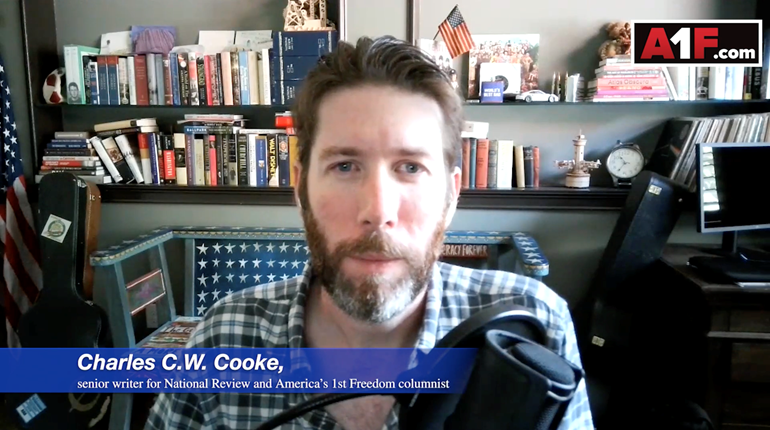
Unable to persuade Congress to pass the gun control they covet, America’s firearm restrictionists have set their eyes on another target—the banking system. In the last couple of months, their efforts have borne fruit.
Bowing to the activists’ pressure, both Citibank and Bank of America have announced changes to their lending policies. In March, Citibank confirmed that it would be accepting no “new retail sector clients” that refused to acquiesce to a novel set of rules. Henceforth, to qualify for financing, Citibank’s partners must decline to sell firearms to 18- to 20-year-olds, stop offering so-called “high-capacity” magazines and opt out of the due-process protections contained within the Brady Bill. In April, Bank of America followed suit, declaring its intention to drop any manufacturer that makes what anti-gunners like to call “military-style firearms” for civilians. Thus, having failed legislatively, the controllers went after the money. And it worked.
One’s first instinct here is to shrug and say, “Fine, I guess I won’t use those banks anymore.” But this, I think, would be to fall into the trap that has been set. In most political circumstances, respect for free choice is imperative. Markets, not the law, are the freeman’s recourse of choice. Here, though? It’s a lot more complicated than that. If one doesn’t like McDonalds, one goes to Wendy’s next door. If one doesn’t like Coca-Cola, Pepsi Cola is on the adjacent shelf.
When Bank of America or Citibank start imposing political conditions on gun manufacturers and others, they do so under the guise of “market power.” In truth, though, their power comes ultimately from an outlet in Washington, D.C.
Banks, however, are a little different. This one affects all of us. It can’t just be shrugged off.
Were I to have my way, the status quo would look dramatically different. Barring a set of basic “public accommodation” rules that prohibited racial discrimination, regulation of the banking industry would be limited. Competition, not law, would provide the primary incentive for banks’ behavior, and neither their profits nor their losses would be subsidized. Entry into the market would be easy, and the giants within the industry would receive no special treatment. Outside of its necessary oversight role, government would be largely agnostic. In consequence, Americans would have more choices, the banks would have more latitude for experimentation and specialization, and taxpayers would not be obliged to fork over trillions of dollars when things went seriously awry. The market would be just that—a market.
Sadly, though, this is not the system under which we live—not even close. Rather, in our present arrangement the banks are inextricably tied up with the government, to the point where they have ceased to be private businesses as traditionally understood. In order to start a bank, one needs a charter from either a state or the federal government—a charter that, once granted, effectively allows the holder to leverage government power in pursuit of private aims. In addition to according market players the imprimatur of the state, charters serve as considerable barriers to entry—thereby blocking out a host of potential competitors—and make available to their holders an array of special advantages, including the ability to borrow at discount from the Federal Reserve and other institutions, to use payment mechanisms that cross state lines, and to take advantage of regulatory structures that are inevitably tilted toward the bigger and better-connected players.
The justification for this system is simple: Banks are indispensable to modern life, and thus they are too important to be left to their own devices. Advocates of this position insist that it is nigh on impossible for a person, let alone a business, to operate without commonplace banking services or access to credit, and they propose that to be denied either is to be cut out of the opportunities provided by the American Dream. In exchange for the establishment of rules that invariably favor the big players within the industry, they favor a firm regulatory hand and a solid set of inclusive anti-discrimination laws designed to ensure that nobody is left behind.
These rules go well beyond everyday deposit accounts, ranging into mortgages, small-business lending and the many dictates required by the 1977 Community Reinvestment Act. Show me a banker, and I’ll show you a man whose hands have been tightly tied.
People of good faith are free to argue over whether this arrangement is for the best, and over which approach—mine, or the status quo’s—is superior. They can disagree, too, as to which is likely to yield better overall outcomes. What they cannot do, however, is to have it both ways. If banking is so important that the state must be heavily involved, then those who control the state have every right to complain about its shortcomings. Usually, “just go somewhere else” is an entirely reasonable suggestion for a consumer complaining about his experiences. Here, alas, it is not. It would be self-evidently grotesque for the government to set up a guild—a guild, recall, that has been bailed out by the taxpayer and that is regulated in his name—and then to hand that guild over to a crew of progressive activists. That, though, is what is beginning to happen in America. When Bank of America or Citibank start imposing political conditions on gun manufacturers and others, they do so under the guise of “market power.” In truth, though, their power comes ultimately from an outlet in Washington, D.C.
The precedent being set here is an alarming one. Let us ignore for a moment that the gun sellers being discriminated against are not solely engaged in business, but in a business that is explicitly protected by the Constitution. Let us forget, too, that the owners of those businesses were among the millions of Americans who helped bail out the companies engaging in that discrimination. Instead, let’s ask the obvious question that their behavior has raised: What is going to happen once this habit starts to spread? Today, the target is guns. Tomorrow, though, it could be speech—or any other constitutionally protected conduct.
Once banks get accustomed to imposing political preconditions upon the disbursement of loans, there presumably will be no stopping them. What, I wonder, is to stop a newspaper editor from being told that his loan is contingent upon his board dropping certain positions? Again, in theory I’m happy to endorse free association, competition and specialization within banking. In my ideal world, Citibank could do whatever it wanted, and I could respond in kind. In my ideal world, Citibank would pay a price for its decisions, and its competition would benefit from theirs.
But we do not live in my ideal world, and the defenders of our status quo cannot have it both ways: If banks are indispensable and propped up by the public in their times of need—a decade ago, remember, Citibank received almost half a trillion dollars in taxpayer money, more than any other bank; Bank of America, with $330 billion, was second in the charts—what room can there be for political discrimination? If it is disastrous for a consumer to be denied banking services, even when that denial comes from a single bank, why it is not disastrous when a business is dictated to by Citibank? Is political favoritism somehow different in its consequences when the victim has an llc by his name?
Once banks get accustomed to imposing political preconditions upon the disbursement of loans, there presumably will be no stopping them.
As far as I can see, gun owners have a few potential responses available to them if they wish to limit their exposure to this sort of behavior (in addition to the obvious, which is to stop using any bank that gets involved in this game). The first is to work toward the deregulation of the banking industry, so that organizations such as Citibank are no structurally different than any other company competing in the marketplace. This, clearly, would be the most tricky, and would take the most effort.
The second is to accept that far-reaching structural change will take an enormously long time, and to focus instead on convincing Congress to add a set of robust “political neutrality” rules to the existing banking regulations. As professor Josh Blackman has pointed out, the state of Georgia already prohibits banks from discriminating against legal firearm dealers (Citibank’s lawyers are presumably going to learn about this law pretty quickly), and there is no solid reason why its example can’t be followed nationally—especially given that we are dealing here with an explicit constitutional right.
The third is for those affected at the state level to sue. In addition to Georgia’s aforementioned rule, a number of states have age-based anti-discrimination statutes that render any corporate rules governing the sale of firearms to 18-year-olds moot. Citibank might be in a privileged position, but it cannot impose rules upon its clients that require them to break state law. ucla’s Eugene Volokh reports that “a third of all states ban discrimination based on age in places of public accommodation,” many with no exceptions for firearms. A handful of cities and counties do, too.
What is not an option is for organizations such as Citibank to be permitted to remain happily in their privileged, quasi-governmental position and to serve as vehicles for the political ambitions of the gun control movement. There are certain responsibilities that go along with being favored by the state, and among those responsibilities is declining to launder public authority into private power.
For a long while now, the big banks have managed to have their cake and to eat it, the upshot of which is that we have neither a market nor a level playing field, but a hotbed of influence-peddling, cronyism and selective discrimination. The line must be drawn here, at the edge of the Bill of Rights.
Charles C.W. Cooke is the editor of National Review Online.

































